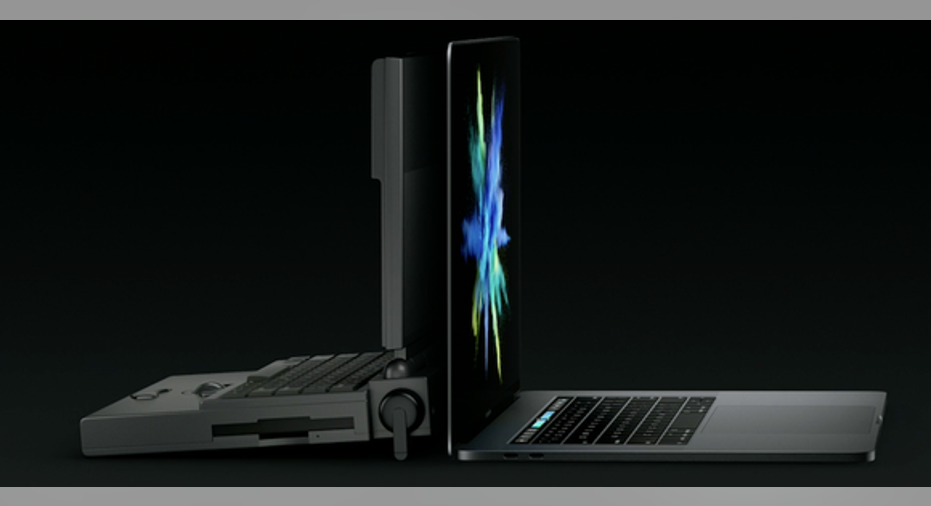DongleGate: Apple's Big 2016 Controversy

Twenty-five years of progress. Image source: Apple.
This happens every couple of years; it's just a lot louder this time around.
In the wake of Apple's (NASDAQ: AAPL)release of new MacBook Pros, which were unveiled last month, there has been considerable user backlash surrounding the company's decision to completely transition all input/output jacks to USB-C (Apple's implementation also supports Thunderbolt 3). The criticisms aren't misplaced, as creative professionals looking to upgrade to the newest models will undoubtedly be inconvenienced by the sheer number of dongles and adaptors that they'll need for their daily workflow. The irony is that USB-C's potential as a universal port is precisely why the controversy is magnified this time. Apple isn't just swapping out one old port for one new port -- it's swapping out a handful of old ports for one new port.
But at the same time, the decision was hardly unexpected, as there had been months of rumors that Apple would switch completely to USB-C as the port of the future. It's useful at times like these to go back and revisit how Apple approaches which technologies to invest in.
That's what he said
Steve Jobs made his final appearance at AllThingD's D8 conference in 2010 and discussed the iPad and the controversial absence of Adobe Flash on the tablet. People were outraged that Apple's new device didn't support the standard web video technology of the time. His response to Walt Mossberg really hit at Apple's broader philosophy:
It should be clear that USB-C is a technology that is in its ascendancy, even if Apple's switch is seemingly premature given the immaturity of the USB-C ecosystem.
A second opinion
There's another quote that's a little more directly relevant here, too. This controversy actually started last year, when Apple launched the 12-inch MacBook, which also only uses USB-C. The main difference is that the move is less likely to attract ire in a consumer laptop, while professionals have greater connectivity needs with their tools and workflow. When asked about the decision in a Mashable interview, marketing chief Phil Schiller acknowledged that these types of transitions are often tough and uncomfortable: "We found that the best thing we could do is push boundaries beyond what's expected, beyond what's comfortable sometimes."
From an investing perspective, the real question is whether or not this controversy will prove to be a fading argument like all past instances, or if there will be some type of lasting impact on Apple's Mac business. Assuming that the industry indeed moves toward USB-C, which by all signs it is (slowly but surely), it's pretty difficult to imagine a scenario where this hurts Apple over the long haul. One encouraging data point is that Schiller also confirmed in a recent interview with The Independent that demand is soaring: "And we are proud to tell you that so far our online store has had more orders for the new MacBook Pro than any other pro notebook before. So there certainly are a lot of people as excited as we are about it."
So far, I'd have to say, people seem to be liking MacBook Pros. It'll all work itself out.
10 stocks we like better than Apple When investing geniuses David and Tom Gardner have a stock tip, it can pay to listen. After all, the newsletter they have run for over a decade, Motley Fool Stock Advisor, has tripled the market.*
David and Tom just revealed what they believe are the ten best stocks for investors to buy right now and Apple wasn't one of them! That's right -- they think these 10 stocks are even better buys.
Click here to learn about these picks!
*Stock Advisor returns as of November 7, 2016
Evan Niu, CFA owns shares of Apple. The Motley Fool owns shares of and recommends Apple. The Motley Fool has the following options: long January 2018 $90 calls on Apple and short January 2018 $95 calls on Apple. Try any of our Foolish newsletter services free for 30 days. We Fools may not all hold the same opinions, but we all believe that considering a diverse range of insights makes us better investors. The Motley Fool has a disclosure policy.



















